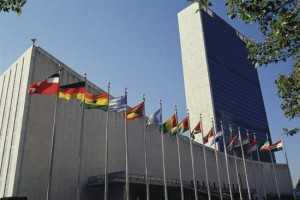Governments Increasingly Object to UN Abortion Agenda
 A growing sense of urgency surrounds the UN development agenda as major milestones approach and long-term goals are set to expire. Of particular concern to some is the fate of sexual and reproductive health and rights. Indeed many governments are expressing increasing exasperation with abortion advocates. In the closing minutes of a recent conference, delegates complained that human rights were being reduced to sexual and reproductive rights.
A growing sense of urgency surrounds the UN development agenda as major milestones approach and long-term goals are set to expire. Of particular concern to some is the fate of sexual and reproductive health and rights. Indeed many governments are expressing increasing exasperation with abortion advocates. In the closing minutes of a recent conference, delegates complained that human rights were being reduced to sexual and reproductive rights.
“[E]verything was pre-directed toward the term ‘sexual and reproductive health and rights’,” criticized one participant speaking for his government, “which is not even a term” in the Cairo agreement “and yet taken for granted.”
The three-day conference held in the Netherlands in July intended to feed into the process of updating the development agenda forged at the Cairo International Conference on Population and Development (ICPD) in 1994. Many of the speakers represented activists who failed to get countries to agree to an international right to abortion at ICPD.
Several delegates complained the conference on “ICPD Beyond 2014 – International Conference on Human Rights” promised to deal with broad issues, yet it focused on “narrowed down” topics.
“Unfortunately, the key topics circumscribe human rights and ICPD to sexual and reproductive health and reproductive rights,” said one participant.
Another called the discussion “clearly a deviation from ICPD.”
While enthusiastically promoting abortion, many speakers expressed frustration at the failure to advance a right to abortion within UN documents. Nafis Sadik, the former UN Population Fund head, referred to the ICPD as the “minimal consensus position” on abortion, and “little progress” had been made in advancing it since. At a Planned Parenthood-sponsored event at the UN in May, Dr. Sadik accused her allies of timidity and “retreating from our own goals.”
Colombian pro-abortion activist Dr. Ana Cristina González Vélez urged attendees to look to UN committees that monitor human rights treaties to interpret a right to abortion absent in the treaties themselves. “This is the way to move forward,” she said.
Dr. Marleen Temmerman was not optimistic about the likelihood of a stand-alone goal on sexual and reproductive health and rights in the post-2014 development agenda. The director of Reproductive Health and Research at the World Health Organization (WHO) urged participants to “think carefully and also politically” about which would be the “best overarching goal where we can embed our human rights agenda.”
Dr. Temmerman also shared how during her early career in Belgium, she and some of her fellow gynecologists decided to perform abortions in open violation of the law with support from their hospital management. The Belgian parliament eventually legalized abortion by a narrow margin.
In more recent years, Dr. Temmerman shifted from flouting standards to setting them. Last year her department at the WHO released a technical and policy guidance on abortion which included arguments for why governments should not legally restrict it.
Despite the overwhelming pro-abortion sentiment expressed in the conference panels, one contributor emphasized the well-being of the unborn. The Chairman of the Kazakhstan Commission on Human Rights was among the leaders featured in a video promoting the conference. “We focus on reproductive health,” said Kuanysh Sultanov. “We prioritize the health of our children, not from the moment they are born, but from the moment they were conceived.”
In her closing remarks, the chairwoman reassured participants that dissenting views would be represented in the conference report.

